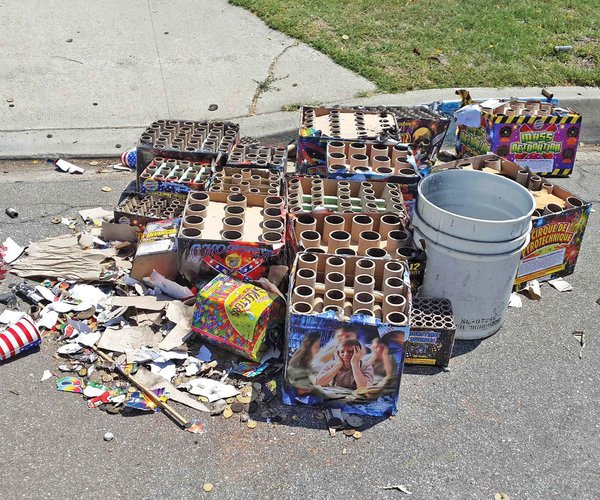Failure to get a notary to attest to a signature on bid documents resulted in a lowest bid submitted by Hensley's Paving of Hickman to be rejected by the city, an act which cost the taxpayers $10,000. It was the third time this year that the lowest bidder was disqualified from a job and filed a protest with the city. Hensley's protest prompted the Ceres City Council on Monday to delve into the city's bidding requirements and strong feelings were expressed.
City Engineer Toby Wells defended the city's strict requirements while City Attorney Mike Lyions noted that the notarization process is in place to prevent a contractor from backing out of a contract by claiming the signature was not legitimate.
The council ended up awarding a $124,754 contract to Breneman Inc., of Walnut Creek but not before a frustrated Vice Mayor Ken Lane engaged the council in considering a contract award to Hensley's anyway. That did not sit well with Mayor Chris Vierra, who makes his living as an engineer.
"The groundwork of their submittal was not met," said Vierra. "They did not read instructions." He cautioned the council against standing on a slippery slope that would cause those who played by the rules to "have an issue." Vierra said he, too, would like to give work to a local firm but could not justify bending the rules for those who failed to follow the rules.
The contract in question is to widen Mitchell Road from Whitmore Avenue to Joy Avenue.
Hensley's has done business with the city of Ceres but was deemed a "non responsive bidder" on the job because the signature of the principal was not notarized. The Hickman firm bid $114,737 to do the work.
At one point, Lane angrily interrupted Lyions as he was defending the city's policy and snapped that he didn't appreciate Lyions' eyes focussed on him. Lyions stated he was not insinuating anything but apologized for ruffling Lane.
After listening to protests of the mayor and Councilman Bret Durossette, Lane softened his stance but said he wants the city to look at modifying the process to get the lowest bid for taxpayers. "I would just like to see something different so this doesn't happen again," said Lane.
"I'm confused by the whole thing," said Daniel Dooley of Hensley's, after he tried to explain why his firm didn't strictly follow the city's rules. Dooley wanted the council to throw out all the bids and start over.
"Obviously there is a clarity problem," said Councilman Eric Ingwerson who suggested highlighting the notarization requirement in red letters "so this type of thing doesn't happen again, hopefully."
However, Wells said as a professional he is opposed to highlighting any part of the bid package since it conveys that that element is the most important when "it's all important."
Problems with incorrect bids, said Wells, are becoming frequent because a more competitive market is attracting firms who are not familiar to the process of bidding on public projects.
In August the city received two protests from firms whose bids were rejected for incomplete bid packages. One was a Visalia firm that lost being awarded as the lowest bidder because the signature was not notarized. At that time, Wells admonished contractors, saying they "better double check your bids."
After their discussion, the council decided not to award the work to Hensley's Paving but pledged to hold a future study session to possibly adjust the process.
"Changing horses in the middle of the stream can certainly muddy up the waters," said Councilman Eric Ingwerson.
Lane said the city may want to follow the city of Modesto's practice of allowing a contractor to get signatures notarized within 24 hours of submitting a bid package.
City Engineer Toby Wells defended the city's strict requirements while City Attorney Mike Lyions noted that the notarization process is in place to prevent a contractor from backing out of a contract by claiming the signature was not legitimate.
The council ended up awarding a $124,754 contract to Breneman Inc., of Walnut Creek but not before a frustrated Vice Mayor Ken Lane engaged the council in considering a contract award to Hensley's anyway. That did not sit well with Mayor Chris Vierra, who makes his living as an engineer.
"The groundwork of their submittal was not met," said Vierra. "They did not read instructions." He cautioned the council against standing on a slippery slope that would cause those who played by the rules to "have an issue." Vierra said he, too, would like to give work to a local firm but could not justify bending the rules for those who failed to follow the rules.
The contract in question is to widen Mitchell Road from Whitmore Avenue to Joy Avenue.
Hensley's has done business with the city of Ceres but was deemed a "non responsive bidder" on the job because the signature of the principal was not notarized. The Hickman firm bid $114,737 to do the work.
At one point, Lane angrily interrupted Lyions as he was defending the city's policy and snapped that he didn't appreciate Lyions' eyes focussed on him. Lyions stated he was not insinuating anything but apologized for ruffling Lane.
After listening to protests of the mayor and Councilman Bret Durossette, Lane softened his stance but said he wants the city to look at modifying the process to get the lowest bid for taxpayers. "I would just like to see something different so this doesn't happen again," said Lane.
"I'm confused by the whole thing," said Daniel Dooley of Hensley's, after he tried to explain why his firm didn't strictly follow the city's rules. Dooley wanted the council to throw out all the bids and start over.
"Obviously there is a clarity problem," said Councilman Eric Ingwerson who suggested highlighting the notarization requirement in red letters "so this type of thing doesn't happen again, hopefully."
However, Wells said as a professional he is opposed to highlighting any part of the bid package since it conveys that that element is the most important when "it's all important."
Problems with incorrect bids, said Wells, are becoming frequent because a more competitive market is attracting firms who are not familiar to the process of bidding on public projects.
In August the city received two protests from firms whose bids were rejected for incomplete bid packages. One was a Visalia firm that lost being awarded as the lowest bidder because the signature was not notarized. At that time, Wells admonished contractors, saying they "better double check your bids."
After their discussion, the council decided not to award the work to Hensley's Paving but pledged to hold a future study session to possibly adjust the process.
"Changing horses in the middle of the stream can certainly muddy up the waters," said Councilman Eric Ingwerson.
Lane said the city may want to follow the city of Modesto's practice of allowing a contractor to get signatures notarized within 24 hours of submitting a bid package.





